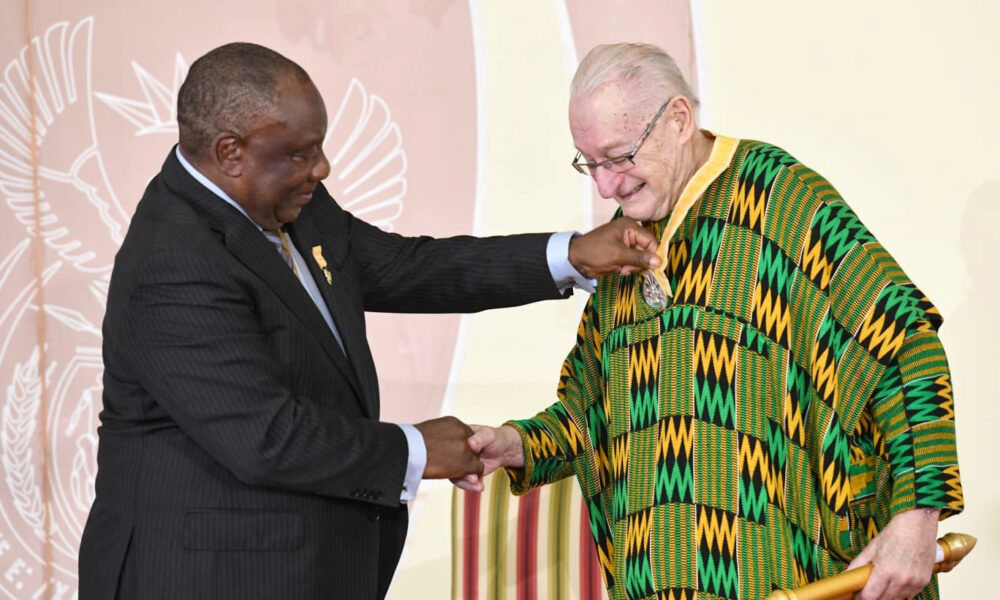SA
SA poet gets stellar recognition with Order of Ikhamanga

When Keith Gottschalk heard he was to receive the Order of Ikhamanga in Silver on 28 April, “I was stunned! It was like a fairy tale. When I saw how many of the national honours were awarded posthumously, I felt happy that I’m still alive at 77 years old to enjoy it,” the poet, academic, journalist, and activist told the SA Jewish Report.
The award was given “for using his creativity to call critical attention to oppressive and unjust laws through performative political poetry. His work provided strength and motivated many people to fight for liberation”. President Cyril Ramaphosa bestowed it personally.
Gottschalk’s first collection of poetry (1992) was titled Emergency Poems – a play on all the states of emergency during the 1980s. “The most challenging moments of my life and career was having the apartheid censors ban all the readings I prescribed for my University of Cape Town [UCT] students on Angola and Mozambique; having the Special Branch repeatedly raid my home and confiscate books from my library and confiscate my passport for decades; having my phone tapped and my letters opened; and being detained without trial in Pollsmoor Prison during the 1985 State of Emergency.” He has also fought back against four different types of cancer.
Gottschalk was born in Cape Town in 1946, and raised in the Mother City, where he still lives today. He studied politics at UCT, where he would later begin his academic career as a lecturer.
Gottschalk’s grandfather fled from tsarist Latvia “because he couldn’t get his propiska [similar to the apartheid dompas] signed for the only place that offered him work”, says Gottschalk. “My father was a general practitioner, and my mother a full-time housewife, as was the norm in their generation. We were in the Progressive congregation of Temple Israel, with Rabbi Dr David Sherman then in charge.”
He went to Wynberg Boys schools. About one-third of his matric class was Jewish. He lectured in politics for three decades at the University of the Western Cape (UWC), was head of the political studies department from 2004 to 2006, and a Fulbright scholar from 2009 to 2010. “This year, UWC gave me the retirement honour of promotion to adjunct professor,” he says.
Much of his poetry has political themes, and he has been an activist since his student days against apartheid and social injustice. He was a member of several democratic organisations, including the Civil Rights League and the United Democratic Front. In the 1980s, he performed several of his poems at political rallies.
In the late 1980s, Gottschalk was a founding member of the Western Cape branch of the Congress of South African Writers, which through its workshops, writing groups, readings, and publications gave voice to previously unpublished writers and mentored many younger, aspiring writers.
He’s passionate about many things between heaven and earth, including space. “Highlights of my life and career include watching Sputnik launch the space age in 1957; outliving the apartheid police state and witnessing South Africa achieve democracy in 1994; getting a tenured post at UWC; being wedded to a lovely person, Bernadette; publishing my two poetry collections Emergency Poems (1992) and Cosmonauts do it in Heaven (2022). Cosmonauts includes an elegy to Israeli astronaut Ilan Ramon, published bilingually in English and Hebrew.”
Says Colleen Higgs of Modjaji Books in Cape Town, “I wanted to publish Keith’s latest collection of poems, Cosmonauts, for many reasons. It’s a highly innovative collection put together over a 20-year period. I love the way he combines social and political consciousness into poetry that’s about science and technology. Keith has a sensitivity to those he writes about that’s remarkable, and the way he weaves the concerns of the humanities into poems about advances in space exploration is unusual in South African literature.
“It was a pleasure to publish this collection by Keith, who has put so much energy and effort into supporting the writing and creativity of others, and wonderful to see him honoured by the president in this way,” Higgs says.
Gottschalk is a member of the Astronomical Society of Southern Africa, the British Interplanetary Society, and The Planetary Society (in the United States). “I felt privileged to witness the space age: Sputnik; Yuri Gagarin; Project Apollo landing 12 Americans on the moon; the international and other space stations; and a fleet of planetary probes fly past every planet in our solar system.”
For seven years, he ran a space association on the campuses of UWC and adjacent campus of the Cape Peninsula University of Technology to excite students about astronomy and astronautics. He was also on the advisory panels which helped draft South Africa’s space policy and space strategy during the 2000s.
Jewish values are vital to his outlook, he says. “Rabbi Sherman and others at cheder led us through universal ethical values in the Tanach and Talmud, which were the opposite of racist apartheid and its oppressive police state.”
Regarding the current state of South Africa, he says, “Democracy isn’t a destination but a journey. The depth of our democracy and its institutions is vital, including freedom of the media. Democracy works best with active citizens – so choose your causes, nongovernmental organisations, and political party, participate, and support them!”
He “absolutely” still has faith in the country. “The grass isn’t greener on the other side of the fence – it’s just that their problems are different to ours. The Cape Jewish Chronicle reported that a recent international conference ranked South Africa as one of the safest countries in the world for Jewish people.
“My favourite Talmud quote is Pirkei Avot (Ethics of our Fathers) chapter 2:16: Rabbi Tarfon used to say, “It’s not up to you to finish the task, but you aren’t free to avoid it.” So let’s all continue to build a better South Africa!”